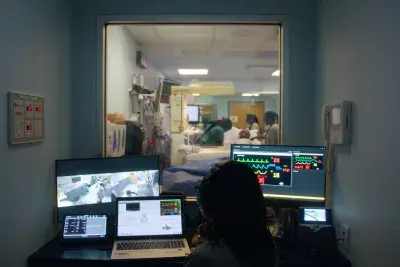Carolyn Lazard, Fiction Contract, 2025 (still). Single-channel video, color, sound, 9:11 min. Courtesy the artist and Trautwein Herleth, Berlin. [In a small dark control room, a person sits in front of multiple computer monitors while observing people in an adjoining patient room via an interior window.]
Performing Conditions: Artistic Labor and Dependency as Form

A group exhibition examining the vexed relationships between art, labor, debt, and dependency.
The artists in Performing Conditions engage many landscapes of labor: plantations and museums, hospitals and factories, studios and households. But their artworks could all be said to refuse the myth of art’s autonomy: its putative freedom from history, politics, and the social conditions of its making. Instead, they dramatize art’s networks of debt and dependency, two terms that resonate across the porous boundaries of Marxism, the Black radical tradition, socialist feminism, and disability studies.
Just as a contract requires a cosignatory to exert its force and a score relies on a performer for its realization, many of the artworks in the exhibition are incomplete on their own. They lean on something else or someone else. These dependent forms—delegated and contractually composed performances, historically charged readymades and reproductions, reenactments of the past and rehearsals for the future—owe a debt to the world: as incalculable and unpayable as our debts to each other, or to our mothers.
Accumulation of surplus value creates a different kind of unpayable debt. As Constantina Zavitsanos and Park McArthur have noted, “A distinction must be made between the constitutive dependency of the capitalist (as nothing other than the expropriation of labor) and the dependency of everyone.” Likewise, even as debt has long been a means of racialized dispossession—from sharecropping to subprime mortgages, from student loans to structural adjustments—it is also an ineluctable fact of social life, an ongoing sharing of needs and abilities. Rather than disavowing debts and dependencies, the works in this exhibition seek to proliferate them, elaborating a rich formal and conceptual language of heteronomy and contingency, service and support, leaning and needing. As Fred Moten and Stefano Harney have written, “The landscape of need is dark and lovely.”
Performing Conditions queries the myriad ways that art and art workers are put to work, made to perform, or bound to appear under racial capitalism. Drawing on legacies of institutional critique, the exhibition incorporates works that reflexively perform their own conditions of production, reproduction, circulation, and display. Performance, in the exhibition, extends beyond disciplines like theater and dance to include the performance of ventures, financial instruments, and workers. Similarly, “artistic labor” indicates not just the output of those anointed as artists but also a total field of social activity, an ongoing and endless rehearsal. In Performing Conditions, the conditions of artists and art workers are symptomatic of a larger structure: racial capitalism’s planetary appropriation of human creativity and enclosure of social life. This project—formed by and amid the very antagonism that constitutes its subject—ultimately aspires to help hone the tools at our disposal for anticapitalist analysis in museums, universities, and beyond.
The exhibition will be accompanied by a program of live performances, a film and video screening room, an archival display examining a local history of strikes and refusal, and a hybrid catalogue/reader publication.
Performing Conditions is organized by Natalie Bell, Chief Curator, and Ramona Ngin, Curatorial Assistant.
Sponsors
Exhibitions at the List Center are made possible with the support of Audrey & James Foster, Lucy Moon-Lim & Richard Lim, Cynthia & John Reed, and Idee German Schoenheimer. Additional support for Performing Conditions is provided by the Consulate General of Sweden in New York.
General operating support is provided by the Massachusetts Institute of Technology, the Council for the Arts at MIT, the Vice Provost at MIT, Hashim Sarkis and the MIT School of Architecture + Planning, the Mass Cultural Council, and many generous individual donors. The Advisory Board Members of the List Visual Arts Center are gratefully acknowledged.